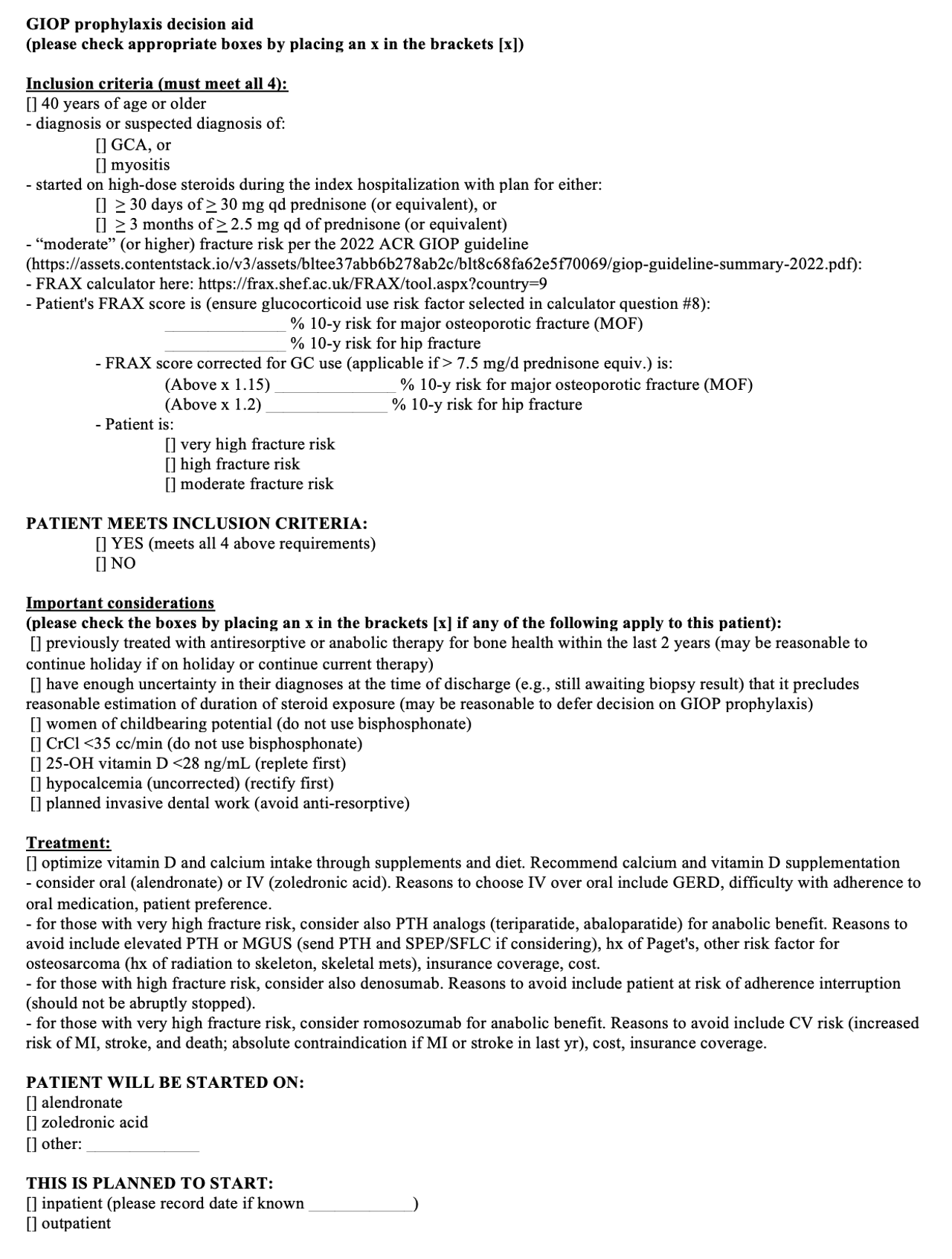Session Information
Date: Sunday, October 26, 2025
Title: (0337–0356) Osteoporosis & Metabolic Bone Disease – Basic & Clinical Science Poster I
Session Type: Poster Session A
Session Time: 10:30AM-12:30PM
Background/Purpose: Glucocorticoids are widely used in rheumatology and are associated with increased fracture risk. The 2022 ACR Guideline for the Prevention and Treatment of Glucocorticoid-induced Osteoporosis (GIOP) strongly recommends assessment of fracture risk for patients initiating prolonged glucocorticoid treatment with pharmacologic treatment for GIOP prevention depending on risk stratification. While many patients with new diagnoses or flares of giant cell arteritis (GCA) or idiopathic inflammatory myopathies (IIM) meet criteria for GIOP prevention, initiation of such therapy is often delayed or missed. We hypothesized that a standardized inpatient screening protocol with administration of inpatient zoledronic acid (ZA) for appropriate patients would improve timely GIOP prevention.
Methods: This project evaluated a new screening protocol for addressing GIOP prevention in hospitalized patients with active GCA or IIM (Figure 1). The protocol, based on the 2022 ACR Guideline, was implemented by the Massachusetts General Hospital Rheumatology Consult Service from February 2024 to January 2025 and compared to a historical cohort from February 2022 to January 2023. The primary outcome was GIOP treatment initiation within 3 months of diagnosis. Secondary outcomes included inpatient ZA use and DXA completion within 6 months of initial evaluation. Patients were identified by billing codes and chart review, with exclusions for factors including age < 40, prior anabolic or antiresorptive therapy (within the preceding 2 years), renal insufficiency with eGFR < 35 mL/min/1.73 m², and 25-hydroxy vitamin D < 20 ng/mL, noting the latter two factors were uncommon reasons for exclusion, resulting in only 3 excluded patients in each cohort. Fisher’s exact test p-values were used to compare categorical outcomes between the intervention and historical cohorts.
Results: A total of 39 patients were included (19 intervention, 20 historical). Baseline characteristics were similar with respect to age (mean 71.9 versus 70.1 years, respectively), race/ethnicity, and prevalence of comorbidities (Table 1). GIOP preventative therapy within 3 months was more frequent in the intervention group (52.6% vs 40%, p=0.53) with higher rates of inpatient ZA administration (26.3% vs 15%, p =0.45). There were similar rates of other GIOP preventative therapy (26.3% vs 25%, p=1.00) and DXA completion within 6 months (52.6% vs 45%, p=0.75) (Table 2).
Conclusion: Implementation of a systematic inpatient screening protocol and provision of ZA in the inpatient setting for patients with active GCA or IIM has the potential to improve timely initiation of GIOP management. While our outcomes did not reach statistical significance, likely due to a limited sample size over a 12-month period, the increased rate of timely GIOP prophylaxis (noting an already-high baseline rate), particularly with inpatient ZA administration, suggests a potential clinical benefit for an undertreated patient population at risk for significant morbidity. Given its ease of implementation and potential to reduce fracture risk, this intervention will continue as part of our routine inpatient care.
 Figure 1. GIOP Screening Protocol
Figure 1. GIOP Screening Protocol
.jpg) Table 1. Baseline Characteristics of Intervention and Historical Cohorts
Table 1. Baseline Characteristics of Intervention and Historical Cohorts
To cite this abstract in AMA style:
Challener G, Walton Z, Parsons C, Patel A, Tinianow A, Griffin M, Lomanto Silva R, Som A, Yockey L, Fan W, Arvikar S, Bolster M. Inpatient Zoledronic Acid for Glucocorticoid-Induced Osteoporosis Prevention [abstract]. Arthritis Rheumatol. 2025; 77 (suppl 9). https://acrabstracts.org/abstract/inpatient-zoledronic-acid-for-glucocorticoid-induced-osteoporosis-prevention/. Accessed .« Back to ACR Convergence 2025
ACR Meeting Abstracts - https://acrabstracts.org/abstract/inpatient-zoledronic-acid-for-glucocorticoid-induced-osteoporosis-prevention/

.jpg)